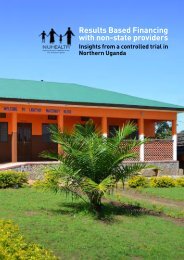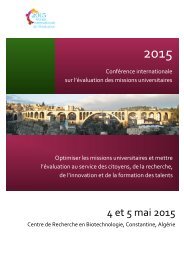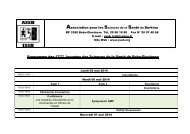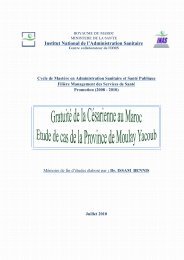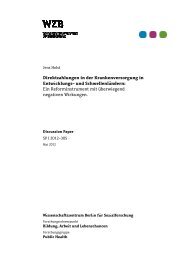histories, cultures, linguistic and lifeexperiences of the Africans (Eze, 1997; Sogolo,1993).From this perspective, African philosophicalassumptions about the nature of reality form thebasis for a made-in-Africa evaluation – one thatdraws from the African perception of the natureof being. On the question of what is a person,the common answer is “I am because we are”, aphrase expressed by the Zulu of South Africa asUmuntu ngumuntu nagabantu, and by theBakalanga of Botswana as Nthu nthu ne bathu.The people referred to are the living as well asthe dead and the unborn (Louw, 2001). Thedead are the ancestral spirits who form part ofthe African extended families and areconnected to the people and talk to the peoplein their daily experiences. African perceptionsof reality thus include a spiritual belief system.The philosophical assumption of an Africanvalue system ties in well with the Africanperception of reality, which emphasises respectfor others and oneself “nthu nthu ne bathu”.While ontological and axiological assumptionsare general to African philosophy, fourcategories of African philosophy are evolvingwith distinct epistemological assumptions(Kaphagawani, 2000) that can inform theconstruction of knowledge in a made-in-Africaevaluation, namely: ethno-philosophy,philosophic sagacity and nationalisticideologicalphilosophy Ethno-philosophyemphasises knowledge as the experiences ofpeople encoded in their language, folklore,stories, everyday experiences, songs, cultureand values, and the importance of team work,cooperation collectiveness, community spirit,and consensus building. Philosophic sagacityemphasises the role of sages in the constructionof knowledge. The nationalistic- ideologicalphilosophy comprises concepts such as theAfrican renaissance and Africanisation (Chilisaand Preece 2005). Africanisation and therefore“Africanisation of evaluation” from thisperspective refers to a process of placing theAfrican world values at the centre of theevaluation process.We would like to proceed with caution andhumility, and say that the struggle to Africaniseacademic disciplines – including the disciplineof evaluation – is gaining momentum and thatour efforts draw heavily from the experiencesand practices of the African sages (indigenousknowledge holders) that are imprinted in theoral literature. We also draw from other Africanscholars who have written extensively onAfrican philosophies, in order to make anAfrican-driven evaluation approach visible. Inother words, African-driven evaluationapproaches have always existed and our effortsare to name them and make them more visibleand conscious. We should not fall into theWestern deficit of theorising about ourselvesand claim that Africa-driven evaluationapproaches do not exist. Our argument is thatwe are valorising and boldly naming Africanevaluation approaches that are evident in theeveryday things Africans do to judge, and alsoto produce evidence for their judgment. Thereal problem is not that African-drivenevaluation and development practice havefailed, but rather they have not been given achance and space in academic and practicediscourses.While a number of efforts are being made to“Africanise” the theory and practice ofevaluation today, we are still facing an uphilltask in translating these efforts into widespreadpractice, especially on the continent, as theevaluation knowledge and practice gatekeepersare still mostly from the North. In terms ofpractice, the few efforts that are available aremostly mere modifications of Northern rootedand driven practices.. Adair, et al. (2001) usedthe term indigenisation to describe ‘theblending of an imported discipline with thegeneration of new concepts and approachesfrom within a culture.” To that extent, there hasbeen an Africanisation of evaluation asmeasured by cultural reference, which isdefined as the extent to which the evaluationprocess emanates from the culture in which it isconducted. Cultural reference is measured bymention of “country, its customs, norms orbehaviours not found in the West” (Adair1993:152).There is also culture-based justification andconceptual bases for evaluation as measured bythe extent to which the conceptual frameworkfor the evaluation emanates from the religion,cultural traditions, norms, language, metaphors,indigenous knowledge systems, communitystories, legends and folklore, social problems,rapid social change, or public policies of thestudies culture, as opposed to conceptualframeworks from some universalistic or“developed world literature” (Adair et al.,1993). An indigenised evaluation methodologyis also used.There are arguments that this indigenisation orAfricanisation does not go deeply enough toqualify as African rooted and African driven.African Thought Leaders Forum on Evaluation and Development, <strong>Bellagio</strong>, Nov 2012 33
Scholars who take this view argue that thechallenge for practitioners and academics onthe continent is not to identify and describefrom practice, for such a practice does not exist.Instead it is to identify and describe accordingto who we are/were as Africans, how weunderstood development and how wemonitored and evaluated it.Africa rooted and African drivenevaluation model - the African evaluationtreeAfricanisation of evaluation requires placingAfrican worldviews at the centre of theevaluation process. We propose an Africandrivenevaluation tree that has two branches:the decolonising and indigenous branch; andthe relational evaluation branch and idealcommunity stem.The decolonising and indigenisingevaluation branchFor this branch, we invoke a Batswana proverb“dilo makwati di kwatololwa mogo ba bangwe”meaning “we learn from one another,”, and anAfrican proverb, “knowledge is like a baobabtree, no one person can embrace it alone”.These proverbs serve to celebrate the adaptationof the accumulated Western theory and practiceon evaluation to serve the needs of Africans.We live in a global village. No one can existalone. The continuing adaptation of Westernapproaches to make evaluation serve theAfricans is a commendable effort that deserves avisible branch in the African-driven tree.An African decolonisation and indigenisationevaluation should have five key elements:African Thought Leaders Forum on Evaluation and Development, <strong>Bellagio</strong>, Nov 2012 34



